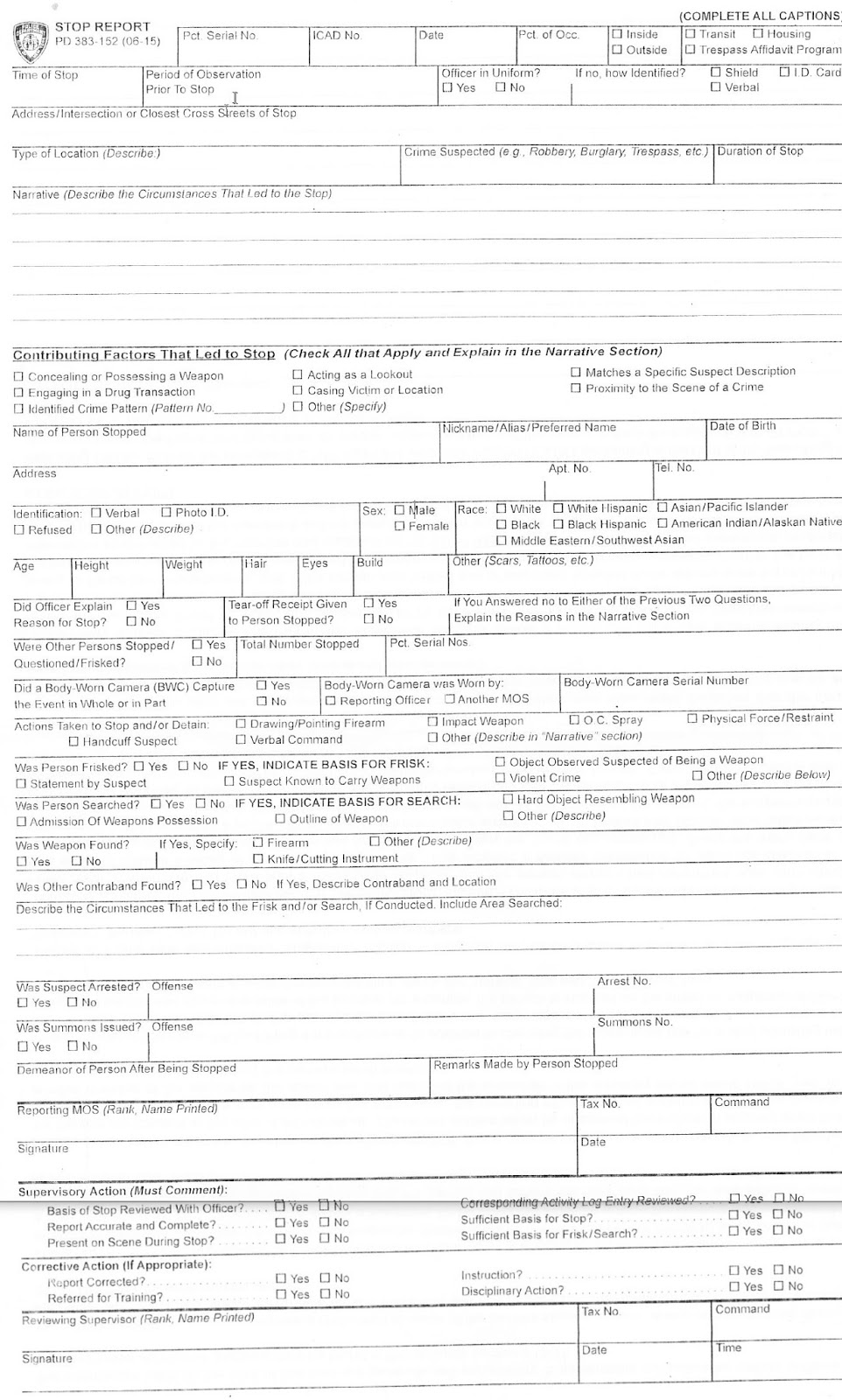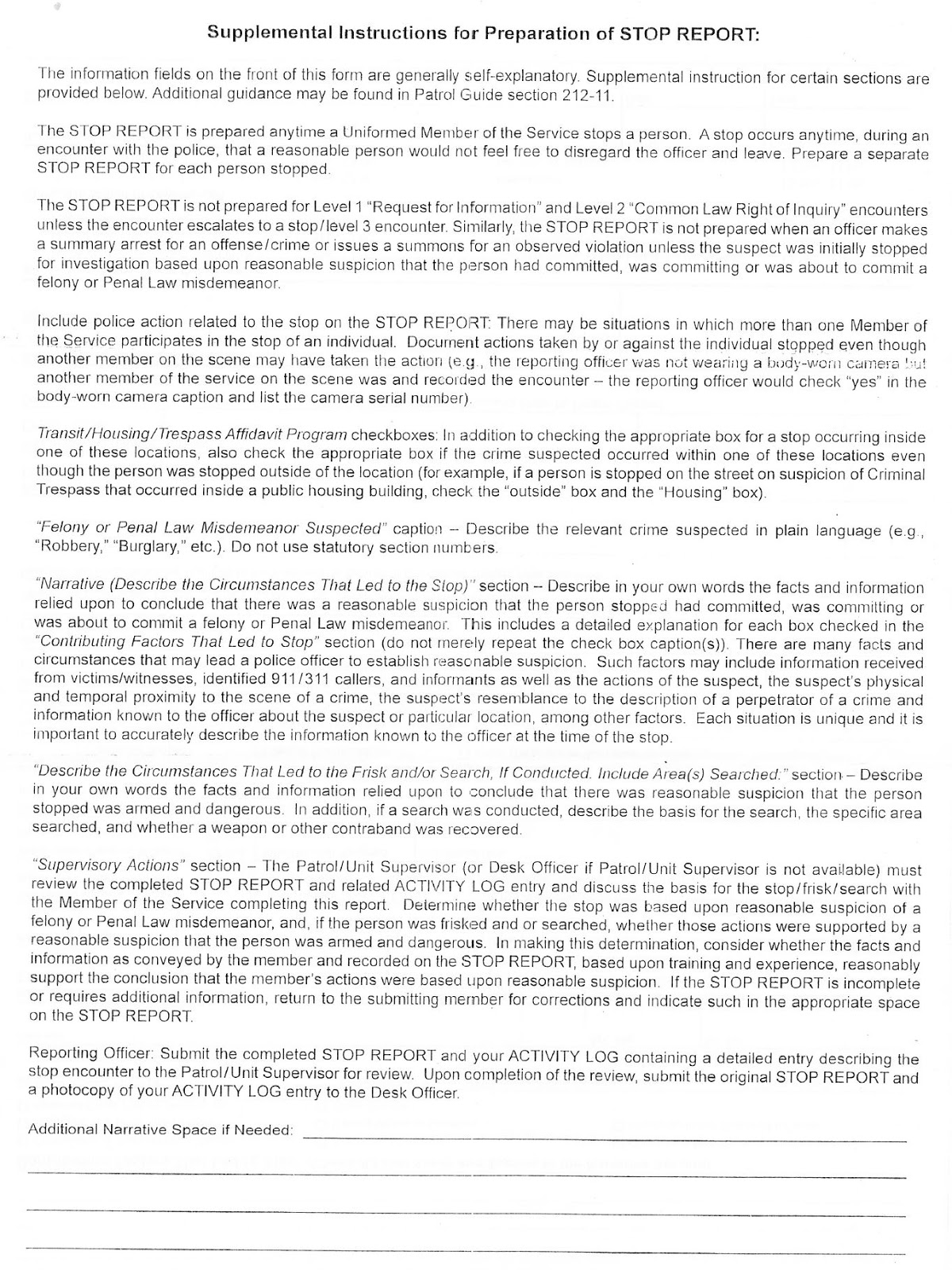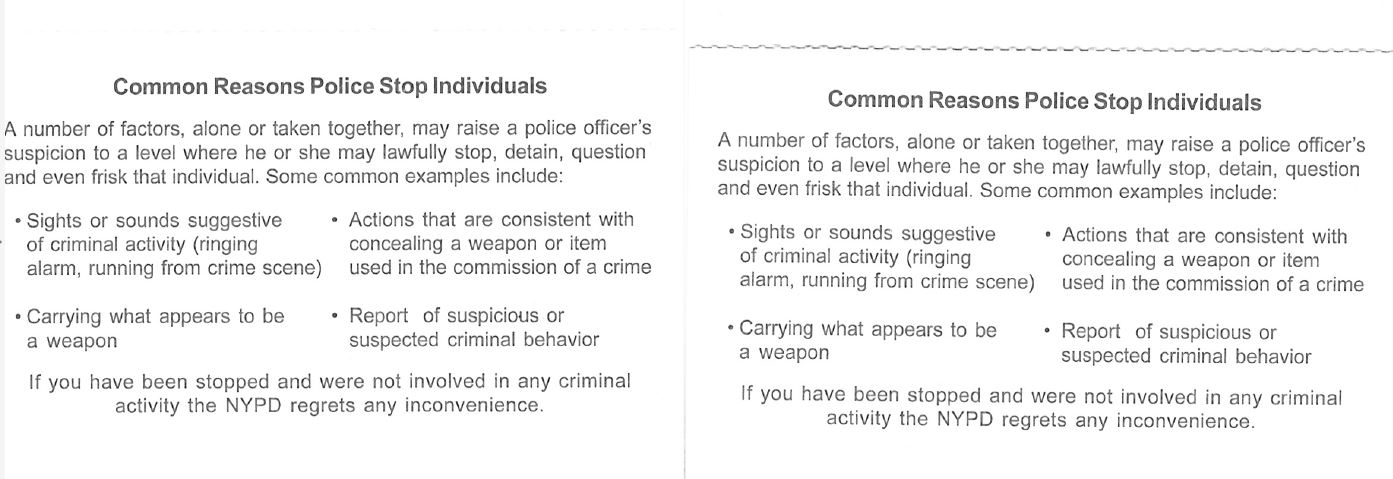Welcome the NYPD’s “PD 382-152” (06-15), née UF-250, AKA Stop Report, just FYI:
This new “UF-250” replaces the old “UF-250” from 2002 that made an unconstitutional mockery of reasonable suspicion as laid out in Terry v. Ohio. (Also FYI, the original form actually called a UF-250 is long dead; long live the UF-250!)
If the goal is fewer stops, add paperwork to each and every stop. Two things will be accomplished:
A) There will be fewer stops.
B) More stops will go unrecorded. (Who the hell has time or desire to fill out a form every time and tell a sergeant every time you stop somebody?)
And what’s clever, is that in the supervisory action (must comment), you can’t just swipe down the “yes” column. It throws a “no” in there just to slow you down.
More importantly, and correctly, there’s an actual “narrative” section. Yes, police officers will actually have to “articulate” their “reasonable suspicion” rather than checking a box saying “furtive movement.”
And the back:

And then you’re supposed to give the person this card (fat chance):

Years or weeks from now, when past years’ “stop question and frisk” controversy is but a footnote to NYPD history, this form will still exist. And then, every time an officer doesn’t fill one out — because, for instance, there’s work to be done or there won’t be any forms available — he or she will be in violation of the patrol guide.
Business as usual will adopt to get things done in a organization designed to be dysfunctional. Because we don’t really want an officer spending 5-15 minutes filling out a form and debriefing a sergeant every time they briefly stop somebody or pat a criminal down to make sure they’re not armed. (Can you “frisk” a person without “stopping” them? I don’t think so.) And then one day further in the future an officer will get in trouble for not following the absurd rules.
Footnote from 2000: “Completion of the UF-250 form has been required since 1986. In 1997, however, Commissioner Safir declared filing the UF-250’s “a priority” that should be “rigorously enforced.” As a result, filings by the SCU, to cite one example, rose from 140 in 1996 to 18,000 in 1997.

It seems to me it would be better in every way if officers filed these reports immediately (on the scene) using smartphones or tablets.
Better yet, cops could call a police department line and leave a voicemail message. Then a secretary could listen to the message, type up the report, and send it to the officer. He could review it at the end of his shift, make any necessary edits, then click "submit" and be done with it. It would take less than a minute. *Ring ring*: "Today at 3:30pm, I stopped Joe Schmoe, M/W, DOB: 1-1-90, in the 300 block of Whatever Street because he was constantly adjusting the front waistband area of his pants and looking over his shoulder nervously. From my training and experience, I know that criminals often conceal firearms in the front waistband area of their pants, and I therefore believed Mr. Schmoe was armed. I ordered Mr. Schmoe to stop, and he complied. I performed a frisk but found no weapon. I issued Mr. Schmoe a stop receipt and then released him. No force was used."
I think most police departments under-utilize civilian employees. If they used lower paid, easier-to-train civilian employees for administrative crap, cops would spend more time doing proactive policing and would cut fewer corners.
Adam, this ancient dream of using lower-paid civilians for admin crap never works out.
First, who's lower paid than cops? What are you going to get for that kind of money, minus the intangible rewards of being an actual cop? Peoples lives, freedom, careers depend on these forms being filled out properly. Are you going to trust that to what's basically a DMV lady?
Finally, is there really a time savings? The cop has to dictate and review each form, then correct and re-review as needed. Also, if filling out the forms by hand is going to take up a big chunk of a cop's shift, then you will need almost as many secretaries as cops – probably a 1:4 ratio. Even if these ladies make half what a cop does, that means a 1/8 increase in your payroll for a form.
JSM
if officers filed these reports immediately (on the scene) using smartphones or tablets.
Out here that's the way it's done. "Field cards" that were actual paper haven't been a thing in over ten years. We're using Versaterm's software and in there it's called a "street check".
Every time they pat a criminal down? Have you seen the stats on how often Stop and Frisk was actually productive? Either the NYPD is the world's worst at spotting criminals or they didn't actually care if the people they were stopping were criminals.
I do wonder if "for being a fucking mutt" is going to make it onto the new narrative section.
Contact cards are done for in Chicago, too. Starting on Jan 1 we have to fill out a similar three-page form called an "Investigatory Stop Report" and then provide the subject with a receipt. This includes stopping someone for public urination whether you frisked them or not.
Proactive policing took another step back.
Do you think paperwork in CPD has linked to less proactive policing and more murder? Any specifics?
I honestly have no proof that the extra paperwork will correlate into higher crime rates. What I do know is that the rank and file are feeling like we've been ran over with a bus. Motivation to do any street stops is waning. I think it might be a temporary feeling but coupled with the Department of Justice putting us under the microscope, I can see how officers will be more hesitant to do proactive work.
Today in roll call, after being given the policy updates on street stops and the new "use of force" general order, the lieutenant explained that stops for minor crimes was no longer an enforcement priority. I then asked "is broken windows policing dead in Chicago?" He replied "the public doesn't want to see someone killed for selling loose cigarettes, so don't stop anyone for selling loose cigarettes in case something like that happens." That bothered me.
My lieutenant's quote wasn't exact, but similar.
Something I just thought of:
Broken windows never really made it into the public discussion. Whether it was a failing of pd's public communications, or a failing of the media, or both, I did not learn about the theory of broken windows from the mainstream mass media when it was being implemented. I had to dig into small circulation long form journalism such as the Atlantic, and only later when I did a masters degree was it fully laid out for me.
This in spite of being an intelligent, newspaper-reading adult throuout the period in question.
My point is that, since for whatever reason there was no public discussion of broken windows when it was adapted and thru out its heyday, should we be surprised when so much of the public and their elected reps think they can cast it aside so easily?
I would contrast gun control, speed limits, dui law, and drug legalization as examples of criminal justice policy that got full public discussion.
Maybe it's because broken windows is seen not as a policy in itself, but as a rather technical way of accomplishing policy goals?
JSM
In California, a LOT of full-time workers are paid a LOT less than cops, and still they have trouble finding enough cops. Weird.
pbs.twimg.com/media/CNX8v1XWUAA7AvM.png:large
Hopefully the link works. It's an image of an early "Field Interview Form" designed by the IACP for the Rochester Police Bureau to use in 1963. Ah, yes, the good ol' days.
That's pretty much the same field interview form that I (sometimes) filled out in 2001. I still have a few blank ones. Might still be in use.
The "stop" forms came about in the 1980s, I think.
Read this article today and thought of your post. mimesislaw.com/fault-lines/the-numbers-dont-lie-the-police-do/5733?- The general idea is that stop and frisk is not so much dead, as that it is out of public, if not police, fashion. Thus, less emphasis on documenting stops; not so much less emphasis on actual stops. This would seem to go along with your observation that more detailed paperwork would lead to more unrecorded stops.
Yeah, there sure aren't going to be many bullshit for-"productivity" stops. And there still could be good stops based on reasonable suspicion.
The problem is — what I don't like — is the system is once again being set up to screw the cops. Because unrecorded stops aren't a problem… until they are.
And to ask cops to fill out a bitch of a form for doing their job — but work they don't have to do — *is* asking too much. It's like telling me to ask students questions in class. But when I do, just fill out a form every time. I mean, maybe I'm biased. And wouldn't it be nice to have data on who gets asked questions? But if I had to fill out a form every time I asked a question, I would stop asking questions.
Paperwork is a huge problem in policing.
Isn't the idea behind the change in the form precisely to discourage the volume of stop and frisks that had been occurring? All I know is what I read in the papers, but there's certainly been plenty of discussion of the idea that the NYPD had been stopping and frisking too many people with insufficient justification.
You might think that this will discourage stop-and-frisks too much, and that it's overkill, but objecting to it because it will discourage them at all seems like missing the point.
But bad massive stop and frisk had already ended before this form. You don't need to create paperwork.
This article kind of hits it on the head that shockingly the police do actually make a difference:
dnainfo.com/chicago/20160113/loop/chicago-police-street-stops-decrease-dramatically-amid-sinking-morale
In New Orleans, nearly 60% of black citizens believe police do actually make a difference:
"In a survey released in August by National Public Radio and the Kaiser Family Foundation, nearly six in 10 black New Orleanians said their neighborhoods did not have enough of a police presence…"–NY Times
nytimes.com/2015/10/03/us/raft-of-armed-robberies-puts-new-orleans-diners-on-edge.html?ref=todayspaper
Second half of that NY Times quote on New Orleans crime situation is also significant:
"and blacks were more than twice as likely as whites to say they were very worried about becoming victims of a crime. However, blacks were also far less likely than whites to trust the police to do what is right most of the time."
Highlights the bind the US has historically put African Americans (and police) in: confined to the worst neighborhoods, urban black residents most need police protection and frequently ask for it but far too often they get violent, unconstitutional, and unethical policing. There's a disconnect, perhaps, in what people want — protection from violent criminals and a substantial decrease in street disorder — and what they get — unsolved murders and proactive investigative street stops which to residents can seem like unwarranted and racially motivated harassment.